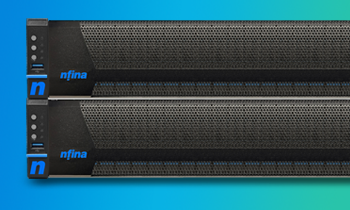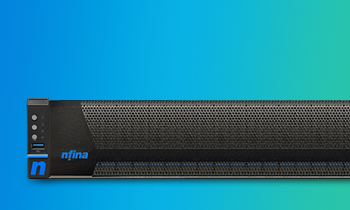Hyperconverged Storage
ensuring continuity, reliability, & performance across your IT environment

Nfina Hyperconverged with High Availability
Nfina’s Hyperconverged Storage with High Availability servers & towers are dual-node models developed for businesses requiring a High Availability solution with numerous VMs, maximum performance, and uptime. These hyperconverged servers support various drives and provide a high level of security, redundancy, and fast data response times. Nfina hyper-converged solutions comes with no adware, spyware, bloatware, or trackware.

Nfina Hyperconverged Edge Computing
Nfina’s Hyperconverged Edge Computing servers and towers offer elevated-performance storage for backup, disaster recovery, or business continuity solutions. It’s the ideal candidate for an all-flash storage array or for creating backup storage for a hyperconverged storage cluster. Nfina’s Hyperconverged Storage Edge Solutions can be loaded to direct attach drives, alleviating the I/O bottleneck between high performance and capacity.
What is Hyperconverged Storage?
What are hyperconverged storage platforms? Nfina’s Hyperconverged Storage is a High-Availability (HA) software-defined system with computing, network, storage, and virtualization in a single solution designed for maximum uptime and scalability. The benefits of hyperconvergence storage include a combination of all data center components, storage, compute, networking, and management within a single hypervisor.
Show More
The hyperconverged storage model is built on the concept of convergence, where multiple systems are integrated into one cohesive unit. In this case, traditional data center components such as servers, storage arrays and switches are combined into a single appliance.
In addition to combining all data center components, including storage, computing, networking, and management, Nfina’s hyperconverged offers many other benefits. Nfina’s hyperconverged storage solutions reduce operational costs and simplifies infrastructure set-up and maintenance. Below are some of the additional benefits of using Nfina’s hyperconverged.
Hyperconverged Infrastructure revolutionizes the way organizations manage their storage resources. Unlike traditional infrastructures, hyperconverged infrastructure combines compute, storage, networking, and virtualization into a tightly integrated system that simplifies data management and enhances operational efficiency. The key advantage of hyperconverged infrastructure lies in its ability to consolidate storage resources across multiple servers into a single shared pool. This means that instead of each server having its dedicated storage array, all available capacity is pooled together for greater flexibility and scalability. With this innovative approach, IT teams can easily manage their ever-growing data demands by simply adding more nodes to the cluster without disrupting ongoing operations.
Additionally, hyper converged offers seamless integration with cloud services allowing organizations to seamlessly expand their storage capabilities beyond on-premises infrastructure when needed. By optimizing the utilization of storage resources through hyper converged’s consolidated architecture, businesses can significantly reduce hardware costs while gaining better control over data lifecycle management and improving overall performance.
What is Converged Storage?
Converged storage refers to the integration of different types of data storage technologies into a single, unified system. This innovative approach combines traditional spinning disk drives with solid-state drives (SSDs) and cloud-based storage solutions, offering organizations an efficient and flexible solution for managing their data.
By converging multiple storage resources into one cohesive platform, businesses can optimize their infrastructure while reducing complexity and costs.
Show More
Converged storage systems typically include features such as automated tiering, which intelligently determines where data should be stored based on its value and frequency of access. This ensures that frequently accessed or critical data is readily available on high-performance SSDs, while less frequently used or cold data can be moved onto slower but more cost-effective disk drives or even offsite in the cloud.
Moreover, converged storage platforms often incorporate advanced management tools that simplify administration tasks like provisioning, monitoring performance metrics, and allocating resources effectively across various workloads.
Ultimately, by leveraging converged storage solutions, organizations can achieve better scalability to accommodate growing datasets, improved reliability through redundancy mechanisms such as RAID (Redundant Array of Independent Disks), enhanced performance for demanding applications through faster access times provided by SSDs – all within a streamlined architecture designed to meet modern data demands efficiently.
New Edge-Optimized Technology
When considering up-front costs, this new type of hyperconverged storage lays out the most cost-effective solution for businesses with a fixed-size infrastructure. Figure 1 illustrates how Nfina’s Edge-Optimized technology only requires two nodes to provide redundancy using 4-way mirroring.
Show More
In the event that your business experiences growth and requires more storage, Nfina’s Edge-Optimized architecture offers the option to add storage to an existing node or place it below the node with a JBOD. On the other hand, competitors with traditional hyperconverged architecture typically require a minimum of three nodes and a storage switch, resulting in increased power consumption. This means that if expansion is needed with traditional hyperconverged storage, an extra node must be added, leading to even higher power consumption and increased heat production.
As a result of Nfina’s hyperconverged storage, operational costs, such as cooling, will be significantly lower, resulting in one of your company’s most energy-efficient storage solutions.
To learn more about this groundbreaking hyperconverged storage technology, check out our white paper here.

Figure 1
Benefits of Hyperconverged Storage
Scalability & Agility | Nfina’s hyperconverged storage enables the software-defined data center, improving scalability and agility while enabling a software-centric architecture. With modular scale-out, businesses can start with just a few nodes and add more as needed, without having to guess how to build their data center infrastructure.
Customization | Hyperconverged storage is a proven architecture that supports a range of workloads, and within a hyperconverged system, it is possible to customize servers to the needs of specific workloads.
Low Up-Front Cost | Nfina’s hyperconverged storage has low up-front costs, making it easier to manage capital expenses and avoid overprovisioning. Additionally, because hyperconverged storage is virtual, they can be managed by any IT personnel familiar with the VMs, helping to lower overall operational costs.
Simplicity | With all resources consolidated in one place, IT administrators can manage everything through an intuitive user interface rather than having to juggle multiple tools from different vendors. Our Nfina-View™ software is a great example of this.
Elite Performance | Thanks to Nfina’s hyperconverged storage’s use of high-speed flash memory and other advanced technologies, this translates into faster access times for critical data, which can be essential in today’s fast-paced business environment.
Improved Reliability & Resiliency | With built-in redundancy features such as automated failover, disaster recovery, and replication capabilities, businesses can rest assured that their critical data will always be available when they need it most.
There are many compelling reasons why businesses should consider adopting a Nfina’s hyperconverged storage solution. Whether you’re looking to reduce costs, increase agility or improve performance and reliability – this innovative technology has something for everyone.
The Eco-Friendly Side of Nfina’s Hyperconverged
With Nfina’s hyperconverged storage, compute virtualization and distributed storage replace standard physical and digital environments, reducing carbon emissions significantly. In data centers, IDC® states that the more densely digitalized the storage, compute, and networking layers, the lower the carbon emissions will be.
Show More
Aside from minimizing energy expenses, enhancing energy efficiency is a key focus for data centers. Implementing Nfina’s hyperconverged storage can substantially reduce the space required in your data center. This single solution can replace individual servers, storage arrays, and storage networks, resulting in a more agile data center that seamlessly grows with your business. Nfina’s hyperconverged storage simplifies resource management by allowing you to oversee all aspects of your infrastructure from a central location, while also reducing complexity by eliminating compatibility issues among different vendors.
Introducing Nfina’s hyperconverged storage into your IT environment is an excellent way for your company’s data center to become more energy efficient.
Check out our white paper here to learn more about our Eco-Friendly Solutions.
What to Choose for your Business: Block Storage or Hyperconverged Storage?
Block storage is one of the many industry standard hardware devices and it provides users with enhanced flexibility and the ability to access specific parts of their data without retrieving the entire file. This type of storage, also known as block-level storage, can be found on either storage area networks (SANs) or cloud-based environments. Developers favor block storage for computing applications that demand rapid, efficient, and dependable data protectiontransfer. Its primary benefit is evident when businesses require a high-performing storage system. This solution allows them to allocate resources in real-time, leading to major cost reductions by minimizing wastage.
Show More
As opposed to traditional file-based storage methods, block storage divides information into fixed-sized blocks, each with a unique address.
Features of Nfina’s Hyperconverged Storage
Affordable with business continuity built-in
High-Availability Dual-Controller Clustering
Highly configurable network options
Intel® Xeon® Scalable Processors
High-performance storage for backup, disaster recovery, or business continuity solutions
Diversity of hardware options
For effective Active-Active Disaster Recovery (DR), Nfina’s Edge-Optimized Solutions support highly efficient snapshots. In contrast to traditional hyperconverged storage backups, which could take days, Nfina’s Hybrid Cloud Infrastructure allows you to restore from a natural or man-made disaster in minutes.
What is Software Defined Storage?
Software Defined Storage (SDS) is revolutionizing the way organizations store and manage their data, taking it to new heights of efficiency and flexibility. One notable approach within SDS is hyperconverged storage, which combines storage, compute, networking, and virtualization into a single integrated system. This convergence eliminates the need for separate hardware components and allows for seamless scalability as businesses grow. With hyperconverged storage, organizations can optimize their IT resources by pooling storage capacities from multiple nodes across the network into a shared resource pool. This ensures efficient utilization of available storage space while maintaining high performance levels.
Show More
Furthermore, hyperconverged SDS offers enhanced reliability through its distributed architecture; if one node fails or needs maintenance, others seamlessly take over to ensure uninterrupted access to data. Additionally, this solution simplifies management processes by providing a centralized control panel where administrators can easily monitor and allocate resources according to specific requirements. By leveraging hyperconverged software defined storage solutions, companies can streamline operations while enjoying increased agility in adapting to changing business demands—truly empowering them with an advanced approach that maximizes efficiency without compromising on performance or reliability.
Nfina-Store
Data Storage management
Nfina-Store provides unlimited options to architect storage environments with iSCSI, Fibre Channel (FC) and NFS, SMB (CIFS) protocols for companies of any size – from small businesses, mid-size enterprises to large enterprises.



“We were looking for someone to support the solution across the life cycle of the products. We are overjoyed that we selected Nfina.”
– Joey Watson, VP of Information Technology,
CCB Community Bank
More on Nfina’s Hyperconverged Storage
Unlike its traditional storage counterparts, Nfina’s hyperconverged systems combine compute, storage, and networking into a single appliance. This integration eliminates the need for separate hardware components and simplifies deployment and management processes. Public cloud service providers have recognized the value of hyperconvergence in terms of scalability and cost-effectiveness, as it enables them to offer more efficient services to their customers.
Show More
Branch office deployments also greatly benefit from hyperconverged storage due to its compact form factor and remote management capabilities. Furthermore, public cloud service providers offer virtual desktop infrastructure (VDI) implementation that becomes smoother with hyperconverged systems by providing optimized performance for multiple users accessing virtual desktop infrastructure simultaneously while minimizing latency issues. As organizations increasingly seek agility and flexibility in their IT operations, Nfina’s hyperconvergence emerges as an ideal solution that improves efficiency while reducing costs associated with traditional storage methods.
Converged vs. Hyperconverged
SUSE defines “The difference between a hyperconverged versus a converged infrastructure is that in hyperconverged storage both the storage area network and the storage abstractions are implemented virtually rather than physically in the hardware. This makes it possible to manage and configure all resources within the context of the hypervisor. This eliminates many inefficiencies found in traditional data protection centers and reduces the total cost of ownership (TCO). The tight integration of components is what provides the key benefits of hyperconverged storage: Ease of management and ease of scaling. When an organization wants to add more resources, it simply adds nodes to the hyperconverged storage”


At Nfina, our Eco-Friendly Solutions make it easy for our customers to achieve a lower carbon footprint and play a positive role in bringing about a sustainable future. We design technologies and products to help people understand their impact and actions better.
Nfina’s Hybrid Cloud and Hyperconverged solutions provide energy efficiency by using high-density, lower-power VMs enabling our customers to scale their digital transformations sustainably by optimizing space, reducing power consumption, and lowering cooling and maintenance costs. Nfina is taking a leadership role in doing what it takes to tackle climate change.
Nfina has been carbon neutral for our operations since opening in 2012.
